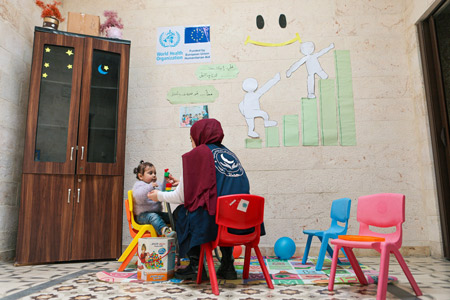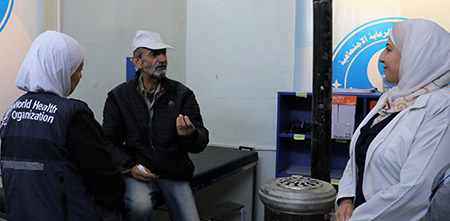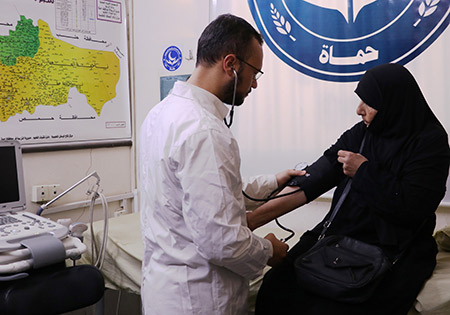 A health worker at Al-Birr Association health centre in Hama engages a young child in early stimulation activities as part of integrated mental health and psychosocial support services. Photo: WHO
A health worker at Al-Birr Association health centre in Hama engages a young child in early stimulation activities as part of integrated mental health and psychosocial support services. Photo: WHO
31 May 2025, Syrian Arab Republic – At 69, Kamal Qassis has learned to adapt. A former schoolteacher, he has lived through years of conflict, repeated displacement, and the mounting cost of daily survival in Syria. “I’ve lost a lot but I’m still here,” he says quietly, seated at the Al-Birr Association health centre in Hama.
Once unable to afford the medication he needed for high blood pressure and a weak heart, Kamal now receives regular checkups and treatment through the centre – support he says has helped him regain a sense of control over his health. “The doctors know me. They take care of me, and I feel stronger now.”
Like Kamal, thousands across Syria are navigating a fragile health system strained by 14 years of crisis and instability. Public health facilities remain overstretched and underfunded, with over half of them either non-functional or only partially functional. The economic uncertainties and funding cuts have only deepened these challenges, threatening the continuity of care for millions.
Yet amidst these pressures, primary health care centres like Al-Birr – supported by the World Health Organization (WHO) with funding from the European Civil Protection and Humanitarian Aid Operations (ECHO) – continue to deliver vital services to those who need them most.
 Kamal Qassis, 69, speaks with health workers during a follow-up visit at the Al-Birr Association health centre in Hama. Photo: WHO
Kamal Qassis, 69, speaks with health workers during a follow-up visit at the Al-Birr Association health centre in Hama. Photo: WHO
Om Bakri, 65, brings her husband to Al-Birr for his heart medication and treatment. “We’ve been coming here for years,” she says. After losing her son and daughter-in-law in the conflict, she now raises her grandchildren alone. “This clinic makes it possible for me to take care of my family.”
So far in 2025, with support from ECHO, WHO helped the Al-Birr Association reach more than 48,000 people with health services – including outpatient consultations, mental health care, nutrition support, and 92 surgical procedures ranging from general to neurological.
“These services are often the only option people have,” says a doctor at the centre. “Without them, many would simply go without care.”
As Syria enters a pivotal phase of transition after years of conflict, the Ministry of Health has outlined key priorities to strengthen essential services, support health workers, and rehabilitate damaged infrastructure. WHO is working closely with the Ministry and health partners to help advance these efforts, ensuring continued access to care while supporting longer-term recovery of the health system.
 Om Bakri, 65, has her blood pressure checked at the Al-Birr Association health centre in Hama, where she brings her husband for regular treatment. Photo: WHO
Om Bakri, 65, has her blood pressure checked at the Al-Birr Association health centre in Hama, where she brings her husband for regular treatment. Photo: WHO
With support from donors like ECHO, centres like Al-Birr continue to play an important role — meeting urgent health needs today, while contributing to the foundation for a stronger and more inclusive system tomorrow.




